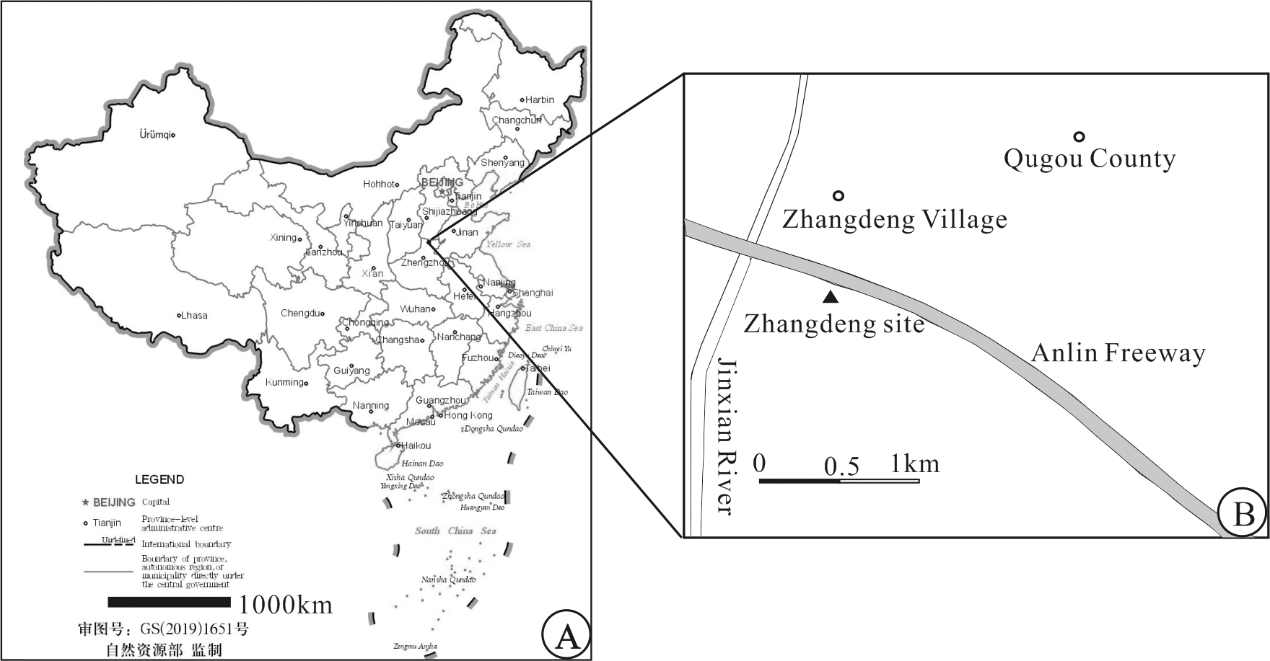

Analysis of carbonized macroremains from the Zhangdeng site, Henan
Received date: 2019-08-24
Online published: 2020-11-25
The Pre-Shang culture of ancient northern China(4000-3600 BP) is not well known, though it is root of the famous early Chinese dynasty- the Shang dynasty (3600-3046 BP cal) and agriculture, walled cities as well as other significant aspects of the Shang culture appeared or were significantly intensified during this period. In particular, little is known about the economy and subsistence practices during this period. The Pre-Shang deposits are dominant in the Zhangdeng site of Henan Province, northern China. Moreover, these deposits have been classified as the Zhanghe variant, which is considered the mainbody of the Pre-Shang culture. We present here archaeobotanical data from the Pre-Shang Zhangdeng site (3750-3600 BP cal). Our results indicate a strong reliance on foxtail millet (Setaria italica (Linn.) P. Beauv.) with minor components of common millet (Panicum miliaceum Linn.). Other domesticated species (wheat and soybean) were also consumed. The material recovered from the Zhangdeng site provides the first evidence confirming the expected patterns for the use of early domesticates in the Pre-Shang culture. Originating from central Hebei Province, the Pre-Shang people have undergone a transition of the subsistence strategy from living basically a nomadic life to adopting agriculture of the central plains in the southward migration, which probably has facilitated the development of the Shang tribe greatly.

Key words: Archaeobotany; Macroremains; the Pre-Shang Culture; Agriculture
Huan LIU , Guoding SONG , Suting LI . Analysis of carbonized macroremains from the Zhangdeng site, Henan[J]. Acta Anthropologica Sinica, 2021 , 40(06) : 1063 -1071 . DOI: 10.16359/j.cnki.cn11-1963/q.2020.0075
| [1] | Pearsall DM (Eds.). Encyclopedia of Archaeology[M]. San Diego: Academic Press, 2006 |
| [2] | 中国社会科学院考古研究所. 新中国的考古发现和研究[M]. 北京: 文物出版社, 1984 |
| [3] | 中国社会科学院考古研究所. 中国考古学—夏商卷[M]. 北京: 中国社会科学出版社, 2003 |
| [4] | 李伯谦. 先商文化探索[A].见:《庆祝苏秉琦考古五十五年论文集》编辑组.庆祝苏秉琦考古五十五年论文集[C]. 北京: 文物出版社, 1989, 280-293 |
| [5] | 邹衡. 试论夏文化[A].见: 邹衡.夏商周考古学论文集[C]. 北京: 文物出版社, 1980 |
| [6] | 拒马河考古队. 河北易县涞水古遗址试掘报告[J]. 考古学报, 1988, 4:421-454 |
| [7] | 魏兴涛. 试论下七垣文化鹿台岗类型[J]. 考古, 1999, 5:65-74 |
| [8] | 沈勇. 保北地区夏时代两种青铜文化之探讨[J]. 华夏考古, 1991, 3:79-88 |
| [9] | 朱彦民. 从考古发现看商族发展过程中的经济转型[J]. 殷都学刊, 2006, 2:9-16 |
| [10] | 王震中. 商族起源与先商社会变迁[M]. 北京: 中国社会科学出版社, 2010 |
| [11] | 河北省文物研究所, 沧州地区文化管理所. 河北省任邱市哑叭庄遗址发掘报告[J]. 文物春秋, 1992, S1: 178-219+303-304 |
| [12] | 河北省文物管理处. 磁县下七垣遗址发掘报告[J]. 考古学报, 1979, 2:185-214 |
| [13] | 河南省文物考古研究所. 安阳鄣邓[M]. 郑州: 大象出版社, 2012 |
| [14] | 侯彦峰, 李素婷, 马萧林, 等. 安阳鄣邓遗址动物资源的获取与利用[J]. 中原文物, 2009, 5:38-47 |
| [15] | Hou L, Hu Y, Zhao X, et al. Human subsistence strategy at Liuzhuang site, Henan, China during the proto-Shang culture (2000-1600 BC) by stable isotopic analysis[J]. Journal of Archaeological Science, 2013, 40(5):2344-2351 |
| [16] | 侯亮亮, 李素婷, 胡耀武, 等. 先商文化时期家畜饲养方式初探[J]. 华夏考古, 2013, 2:130-139 |
| [17] | 侯亮亮, 徐海峰. 河北赞皇南马遗址先商文化时期动物骨骼的稳定同位素分析[J]. 边疆考古研究, 2015, 1:385-397 |
| [18] | 侯亮亮. 先商文化时期先民生业经济研究[D]. 北京:中国科学院大学, 2013 |
| [19] | 李素婷. 豫北地区漳河型先商文化的特征、来源及相关问题[J]. 郑州大学学报(哲学社会科学版), 2009, 2:136-141 |
| [20] | 张立东. 先商文化的探索历程[A].见: 三代文明研究编委会.三代文明研究(一)[C]. 北京: 科学出版社, 1999 |
| [21] | Pearsall DM. Paleoethnobotany-A handbook of Procedures (2nd edition)[M]. San Diego: Academic Press, 2000 |
| [22] | 赵志军. 植物考古学的田野工作方法——浮选法[J]. 考古, 2004, 3:80-87 |
| [23] | 中国科学院植物研究所. 杂草种子图说[M]. 北京: 科学出版社, 1980 |
| [24] | 关广清, 张玉茹, 孙国友, 等. 杂草种子图鉴[M]. 北京: 科学出版社, 2000 |
| [25] | Jacomet S. Identification of Cereal Remains from Archaeological Sites (2nd edition)[M/OL]. Translator: Greig[J]. Basel: IPAS Basel University, 2006 |
| [26] | Reimer PJ, Baillie MGL, Bard E, et al. IntCal04 - terrestrial radiocarbon age calibration, 0-26 cal kyr BP[J]. Radiocarbon, 2004, 46(3):1029-1058 |
| [27] | Ramsey CB. OxCal Program v3.10. 2005[CP/OL]. URL: http://www.rlaha.ox.ac.uk/orau/oxcal.html |
| [28] | 洛阳市文物工作队. 洛阳皂角树—1992-1993年洛阳皂角树二里头文化聚落遗址发掘报告[M]. 北京: 科学出版社, 2002 |
| [29] | 杨晓燕, 刘长江, 张健平, 等. 汉阳陵外藏坑农作物遗存分析及西汉早期农业[J]. 科学通报, 2009, 13:1917-1921 |
| [30] | 刘焕, 胡松梅, 张鹏程, 等. 陕西两处仰韶时期遗址浮选结果分析及其对比[J]. 考古与文物, 2013, 4:106-112 |
| [31] | Hubbard RNLB. Development of agriculture in Europe and the Near East: Evidence from quantitative studies[J]. Economic Botany, 1980, 34(1):51-67 |
| [32] | Popper VS. Selecting quantitative measurements in paleoethnobotany[A]. Hastorf CA, Popper VS. Current Paleoethnobotany: Analytical Methods and Cultural Interpretations of Archaeological Plant Remains[C]. Chicago: University of Chicago Press, 1988: 53-71 |
| [33] | Thompson GB. The Excavation of Khok Phanom Di: A Prehistoric Site in Central Thailand, Volume IV: Subsistence and Environment: The Botanical Evidence (The Biological Remains, Part Ⅱ)[M]. London: Society of Antiquaries of London, 1996 |
| [34] | 赵志军. 两城镇与教场铺龙山时代农业生产特点的对比分析[A].见:山东大学东方考古研究中心.东方考古(第1辑)[C]. 北京: 科学出版社, 2004: 210-216 |
| [35] | 王传明, 赵新平, 靳桂云. 河南鹤壁市刘庄遗址浮选结果分析[J]. 华夏考古, 2010, 3:90-99 |
| [36] | 赵志军, 方燕明. 登封王城岗遗址浮选结果及分析[J]. 华夏考古, 2007, 2: 78-89+I0015-I0016 |
| [37] | 赵志军, 何弩. 陶寺城址2002年度浮选结果及分析[J]. 考古, 2006, 5: 77-86+i0008 |
| [38] | 赵敏, 王富强, 张博 山东烟台照格庄岳石文化遗址植物考古初步结果[N]. 中国文物报, 2008-03-28(07) |
| [39] | 孙永刚. 夏家店下层文化经济形态研究[D]. 呼和浩特:内蒙古大学, 2010 |
| [40] | 陈雪香, 郭俊峰. 山东章丘马安遗址2008年浮选植物遗存分析[A].见:山东大学东方考古研究中心.东方考古(第5辑)[C]. 北京: 科学出版社, 2009: 368-371 |
| [41] | 赵志军, 徐良高. 周原遗址(王家嘴地点)尝试性浮选的结果及初步分析[J]. 文物, 2004, 10:89-96 |
| [42] | Lee G, Crawford GE, Liu L, et al. Plants and people from the early Neolithic to Shang periods in North China[J]. Proceedings of the National Academy of Sciences, 2007, 104:1087-1092 |
| [43] | 赵志军. 关于夏商周文明形成时期农业经济特点的一些思考[J]. 华夏考古, 2005, 1: 75-81+101 |
/
| 〈 |
|
〉 |